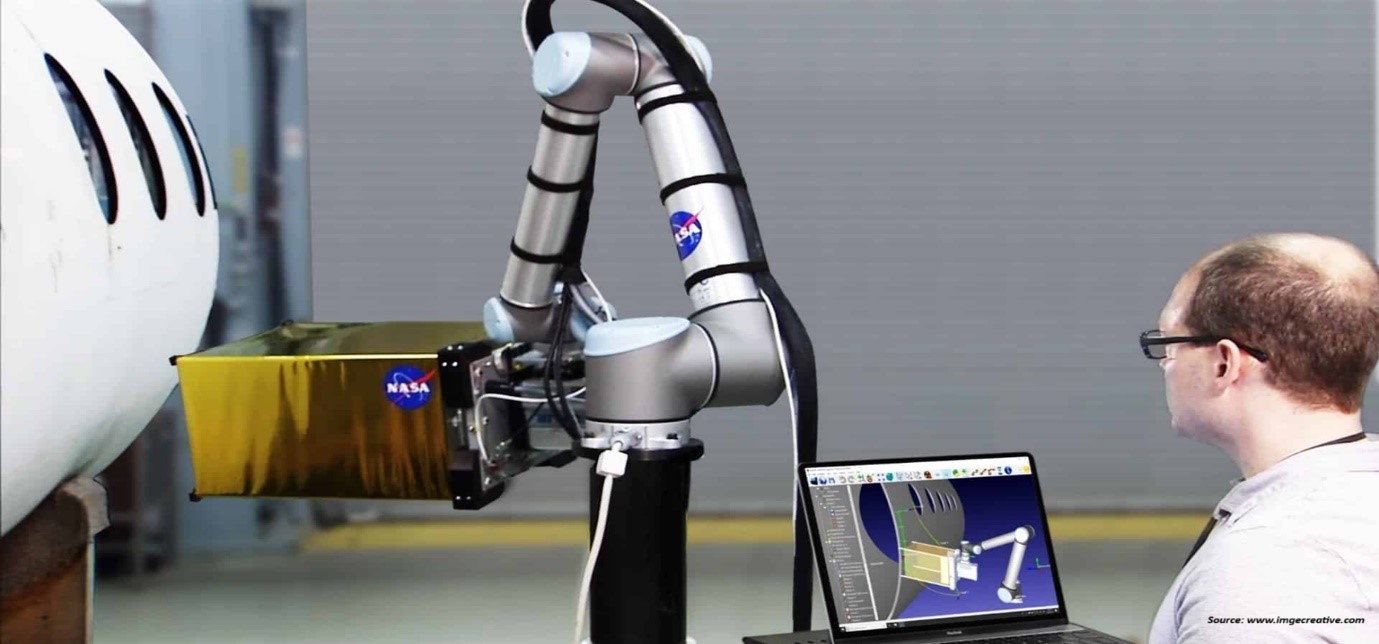
Asia-Pacific Co-Working Space Market by Space Type (Open Coworking Spaces, Private Offices, Virtual Offices, Event Spaces, and Meeting Rooms), by Business Type (Conventional Co-Working, Professional Co-Working, and Others), by Business Model (Sub-Lease Model, Revenue Sharing Model, and Owner-Operator Model), by Membership Type (Hot Desks, Dedicated Desks, Private Offices, and others), by End-User (Independent Professionals, and others) –Opportunity Analysis and Industry Forecast, 2024–2030
Industry: ICT & Media | Publish Date: 21-Feb-2025 | No of Pages: 239 | No. of Tables: 165 | No. of Figures: 110 | Format: PDF | Report Code : IC2034
US Tariff Impact on Asia-Pacific Co-Working Space Market
Trump Tariffs Are Reshaping Global Business
Market Definition
Asia-Pacific Co-Working Space Market size was valued at USD 3.09 billion in 2023, and is predicted to reach USD 11.82 billion by 2030, at a CAGR of 21.0% from 2024 to 2030. Co-working space represents a dynamic and adaptable solution to the evolving needs of businesses. These shared work environments offer flexibility in lease terms and space requirements, appealing particularly to startups and small enterprises seeking to avoid the upfront costs associated with traditional offices.
The communal atmosphere encourages networking and collaboration among professionals from diverse fields, fostering innovation and creativity. Equipped with modern amenities and strategically located, co-working spaces provide cost-effective, scalable, and accessible alternatives for companies seeking a central presence without the constraints of long-term leases. The industry has experienced significant growth as businesses recognize the benefits of this model, embracing the collaborative opportunities and resource-sharing inherent in co-working spaces.
Government Support and Initiatives Fuel Market Growth in Asia-Pacific
The coworking space market in the Asia Pacific region has experienced substantial growth driven by government support and initiatives aimed at fostering entrepreneurship and innovation. Countries like Japan and Singapore have implemented policies and programs to bolster startup ecosystems, offering funding, tax incentives, and infrastructure support. These initiatives create an enabling environment for startups and small businesses, driving demand for coworking spaces as they seek flexible and affordable workspace solutions. With continued innovation and government backing, coworking spaces play a pivotal role in facilitating collaboration, innovation, and growth across Asia-Pacific.
Dynamic Work Dynamics and Entrepreneurial Ecosystems Drive Market Expansion in Asia-Pacific
The Asia Pacific region has seen remarkable growth in the coworking space market, reflecting the evolving work dynamics and entrepreneurial ecosystems across its countries. From the vibrant tech hubs of China and Japan to the burgeoning startup scenes in India and Southeast Asia, coworking spaces have become essential in supporting innovation, collaboration, and flexible work arrangements. This growth underscores the significance of coworking spaces in providing conducive environments for startups and businesses to thrive amidst changing work dynamics, driving innovation and collaboration across the Asia-Pacific region.
Rising Cybersecurity Concerns Hampers the Growth of the Market
The cybersecurity hurdle presents a notable obstacle to the widespread embrace of coworking spaces, particularly for businesses managing sensitive data. These collaborative workplaces rely on shared technology infrastructure, making them susceptible to security breaches that could result in unauthorized access and data exposure. This issue is particularly crucial for firms entrusted with safeguarding client confidentiality and proprietary information. The communal aspect of coworking spaces magnifies risks related to network security, physical access, and device vulnerabilities, leading to concerns among businesses about safeguarding sensitive information.
The Incorporation of Augmented Reality (AR) And Virtual Reality (VR) Creates Future Opportunities For the Market
The integration of Augmented Reality (AR) and Virtual Reality (VR) into coworking stands poised to unlock myriad growth opportunities for the coworking space market. These immersive technologies are positioned to redefine the remote collaboration experience, allowing active participation in virtual meetings, collaborative projects, and training sessions with a heightened sense of physical presence. By transcending geographical barriers and enhancing the interactive aspect of remote work, AR and VR are expected to enhance the appeal of coworking spaces equipped with these technologies.
For instance, in May 2023, Sightful, a Tel Aviv-based company, introduced Spacetop, the world's leading AR laptop, securing USD 61 million in funding from investors such as Aleph and Corner Ventures. Spacetop seamlessly integrates reality with AR, offering an advanced personal computing experience that surpasses the limitations of traditional laptops, thereby revolutionizing the landscape of coworking and remote collaboration. This integration is positioned to attract a broader audience seeking innovative and technologically advanced solutions, thereby significantly contributing to the expansion and advancement of the coworking space market.
India Holds the Dominant Market Share in Asia-Pacific Co-Working Space Market
India's prominent standing in the global coworking industry, ranking second worldwide, is a testament to its thriving entrepreneurial ethos and governmental backing. With nearly 10% of the world's coworking spaces situated in India, closely trailing the U.S., the country's coworking landscape cultivates a dynamic environment for burgeoning entrepreneurs. Government-led initiatives aimed at stimulating economic growth serve as catalysts for the expansion of coworking spaces, fostering an ecosystem conducive to startup prosperity. This official endorsement propels market momentum, drawing in entrepreneurs and nurturing innovation across diverse sectors.
Furthermore, India's vibrant technology startup ecosystem significantly fuels the demand for coworking spaces. Boasting over 112,000 Department for Promotion of Industry and Internal Trade (DPIIT)-recognized startups across 763 districts, India ranks as the third-largest startup ecosystem globally.
Moreover, the nation boasts 111 unicorns with a cumulative valuation exceeding USD 349.67 billion. The emergence of new unicorns, totaling 45 in 2021 and 22 in 2022, underscores the robust growth trajectory of the startup landscape, intensifying the demand for coworking spaces. As startups continue to proliferate and scale their operations, the necessity for flexible workspace solutions becomes increasingly pronounced, solidifying coworking spaces as indispensable elements of India's evolving entrepreneurial landscape.
Thailand to Witness Substantial Growth in the Asia-Pacific Co-Working Space Market
Thailand's burgeoning startup ecosystem, centered primarily in Bangkok, necessitates adaptable and cost-effective workspace solutions to accommodate the expanding entrepreneurial landscape. Ranked 74th globally in StartupBlink's 2023 report, Bangkok's status as a burgeoning startup hub underscores the pivotal role of coworking spaces in nurturing innovation and supporting entrepreneurial ventures.
These spaces offer affordable alternatives tailored to the requirements of emerging enterprises, providing accessible and collaborative environments conducive to innovation and development. As Bangkok solidifies its position as one of Southeast Asia's most robust startup ecosystems, the demand for coworking spaces is anticipated to escalate, driven by the necessity for flexible workspace solutions that address the dynamic needs of startups and emerging businesses.
Simultaneously, the rising prominence of remote work culture in Thailand is reshaping workspace preferences among professionals, fueling the uptake of coworking spaces. With a growing number of professionals and freelancers seeking productive and flexible work environments beyond traditional office confines, coworking spaces provide dedicated workspaces and collaborative settings ideally suited for remote work.
These spaces afford professionals the flexibility to work autonomously while fostering a sense of community and collaboration. As remote work gains traction in Thailand, coworking spaces are poised to play a pivotal role in meeting the evolving demands of professionals, driving the demand for adaptable and versatile workspace solutions nationwide.
Competitive Landscape
The Asia-Pacific co-working space market comprises of various companies including International Workplace Group (IWG) Plc, WeWork Inc., Vast Coworking Group, COWRKS, IndiQube Eco, Awfis Space Solutions Limited, Workshaala, Coworking Studio, Novel Office, The Executive Centre, Newmark Group, Inc., Venture X, Spaces, Eb Space Inc., Garage Society, and others.
The Asia-Pacific Co-Working Space Market Key Segments
By Space Type
-
Open Coworking Spaces
-
Private Offices
-
Virtual Offices
-
Event Spaces
-
Meeting Rooms
By Business Type
-
Conventional Co-Working
-
Professional Co-Working
-
Others
By Business Model
-
Sub-Lease Model
-
Revenue Sharing Model
-
Owner-Operator Model
By Membership Type
-
Hot Desks
-
Dedicated Desks
-
Private Offices
-
Weekender
-
Flexi passes
By End-User
-
Independent Professionals
-
Startup Teams
-
Small and Medium Sized Enterprises
By Country
-
China
-
Japan
-
India
-
South Korea
-
Australia
-
Indonesia
-
Singapore
-
Taiwan
-
Thailand
-
Rest of Asia-Pacific
KEY PLAYERS
-
International Workplace Group (IWG) Plc
-
WeWork Inc.
-
Vast Coworking Group
-
COWRKS
-
IndiQube Eco
-
Awfis Space Solutions Limited
-
Workshaala
-
Coworking Studio
-
Novel Office
-
The Executive Centre
-
Newmark Group, Inc.
-
Venture X
-
Spaces
-
Eb Space Inc.
-
Garage Society
REPORT SCOPE AND SEGMENTATION:
|
Parameters |
Details |
|
Market Size in 2023 |
USD 3.09 Billion |
|
Revenue Forecast in 2030 |
USD 11.82 Billion |
|
Growth Rate |
CAGR of 21.0% from 2024 to 2030 |
|
Analysis Period |
2023–2030 |
|
Base Year Considered |
2023 |
|
Forecast Period |
2024–2030 |
|
Market Size Estimation |
Billion (USD) |
|
Growth Factors |
|
|
Countries Covered |
10 |
|
Companies Profiled |
15 |
|
Market Share |
Available for 10 companies |
|
Customization Scope |
Free customization (equivalent up to 80 working hours of analysts) after purchase. Addition or alteration to country, regional, and segment scope. |

















 Speak to Our Analyst
Speak to Our Analyst





















